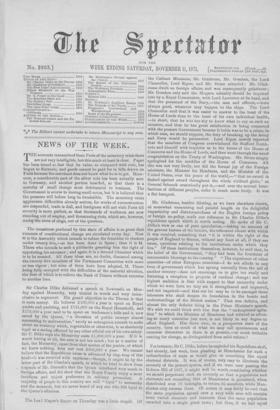Mr. Gladstone, besides dilating, as we have elsewhere shown, at
somewhat unmeaning and painful length on the delightful impartiality and disinterestedness of the English foreign policy or foreign no-policy, made one reference to Sir Charles Dilke's republican speech which is worth noting. He spoke of Sir C. Mike's view as one of pure speculation,—taking no account of the gravest feature of the lecture, the vehement cheers with which it was received, remarking that " it is within the right of the people of England to discuss, without any limit at all, if they see cause, questions relating to the institutions under which they live." Of those institutions themselves, however, he said that, in the belief of the Government, " they had been the fountains of innumerable blessings to the country." " The experience of other countries—of other European countries—I do not allude to any form of government which has sprung naturally from the soil of another country—does not encourage us to give too ready and flattering a reception to projects of cardinal change ; and our highest ambition is that with respect to that monarchy under which we were born we may see it strengthened and improved, and not impaired—and that our lot may be to be amongst those labourers who shall deepen its foundation in the hearts and understandings of the British nation." That was definite, and almost the only definite thing in the Prime Minister's speech. We wish we could think with him that the " underground agita- tion" to which the Minister of Honduras had referred as affect- ing so many countries just now, is not likely in any degree to affect England. Has there ever, in .1t prosperous state of the country, been so much of what we may call spontaneous and causeless discontent as there is at present,—so much irritable craving for change, as distinguished from solid reform ?


































